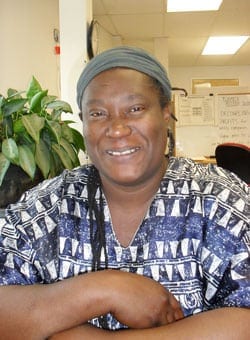
Sandra Hughes, wearing a cheerful blue tie-dyed caftan, beams as she greets the middle-aged woman waiting to see her. Hughes leans back on her chair to retrieve a file.
The woman visibly relaxes when Hughes tells her the file contains names of lawyers willing to give her free advice to deal with her landlord.
Welcome to Eastern Service Worker’s Association (ESWA) on Bowdoin Street in Dorchester, a free membership association for some of the lowest paid workers in Boston. Established in 1977, the association now has more than 30,000 members who come in daily to get help with their utility bills, legal and health matters and sometimes food donations
This is a routine for Hughes, an African American, single mother of four who volunteers 40 hours a week as membership coordinator. Her duties involve signing on new members and attending to their problems with the support of other volunteer members in the office.
Her passion speaks volumes about her belief in what she does and the principles upon which the association stands. She says it is important to be patient with every member who comes forward with a complaint.
“The economy has changed, a lot of people are out of work while others are not getting enough hours,” she says. “Realistically, you are three meals away from committing [a] crime to take care of your family.”
Dawn Hymers, operations manager of the association, says a common denominator among members is that they are either retired, disabled, out of work or on government assistance of some sort.
“Within Massachusetts, we have unemployment that is at a 35-year high. They have cut $2 billion out of the state budget and the city has continued to cut its budget which affects many of our members.”
She says the strategy of ESWA is to hold the state government accountable to the needs of workers through teaching members how to participate in the Workers Delegate Council.
Hughes, who started out as a volunteer 20 years ago, shares a similar experience like many of those she serves. She is struggling with the usual challenges of life, as well as the special needs of one of her children, who is deaf and blind.
As a breast cancer survivor, she stopped doing voluntary work about 10 years ago. But she signed up as member and volunteer at ESWA two years ago during a membership drive when the team knocked at her door. “I loved what they were talking about to help low income workers and felt it was something I could get into right away,” she recalls.
She says her personal challenges have turned out to be asset for her as a volunteer with the association. Four months ago, ESWA appointed her membership coordinator and she describes her experience as amazing.
“I am learning how to help my community in Dorchester and also growing with the organization,” she said.
Despite loving what she does, she says getting emergency food for members is not the solution to poverty as “we still need to work on finding better wages and health care for the working class.”
Realizing that communicating effectively in English is central to the success of every worker, the association also runs a “Learning English” program to strengthen the capacity of members whose first language is not English. The program is held three times a week.
Shamus Barrett, who coordinates the program as a volunteer, says he gets a lot of positive feedback from his 25 students.
“Some of the cases in here are so sad and unfair,” he says. “I enjoy the teaching best of all and am happy to be part of those helping to make life better for service workers.”
The association will soon be going door to door in some parts of Boston to collect food donations for the upcoming holiday season. “These are very hard times and very special times, but also hard when most of our members cannot afford to celebrate Christmas,” Hughes says.






